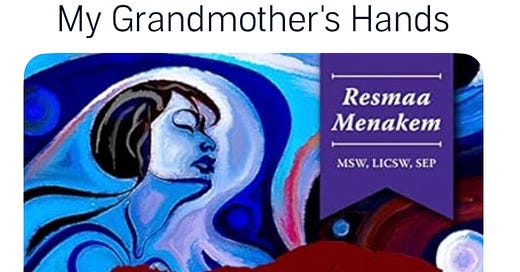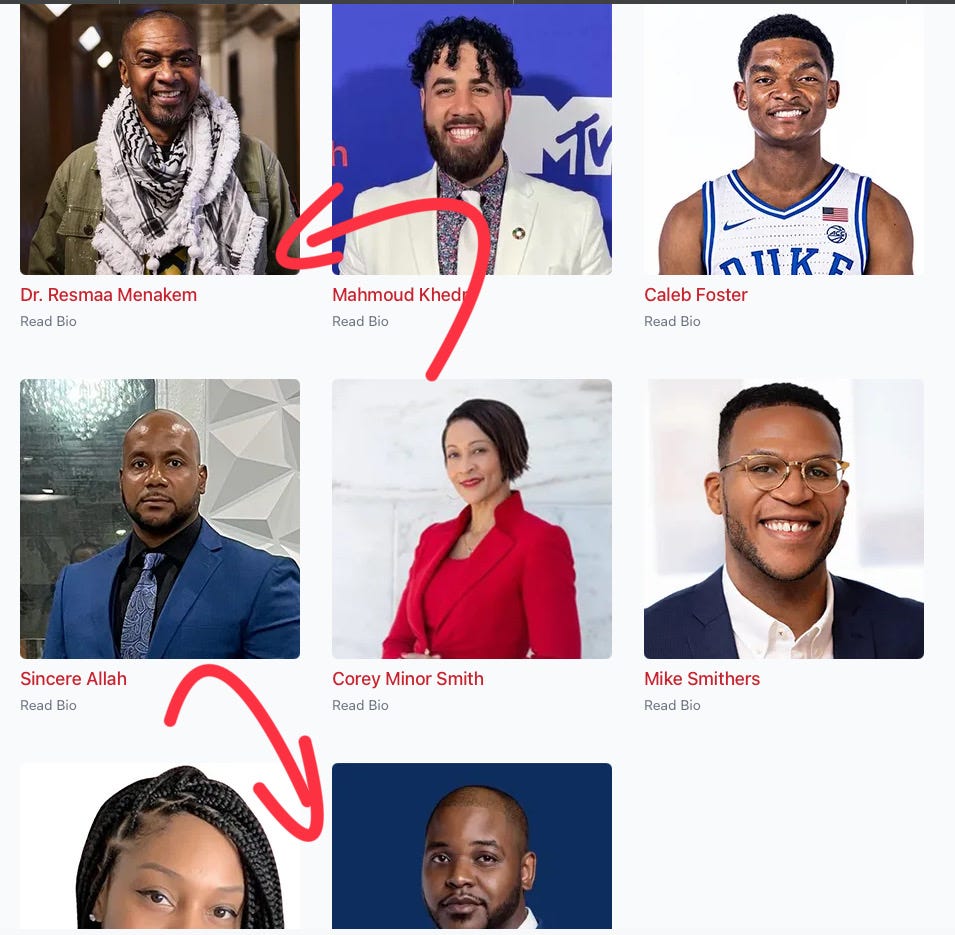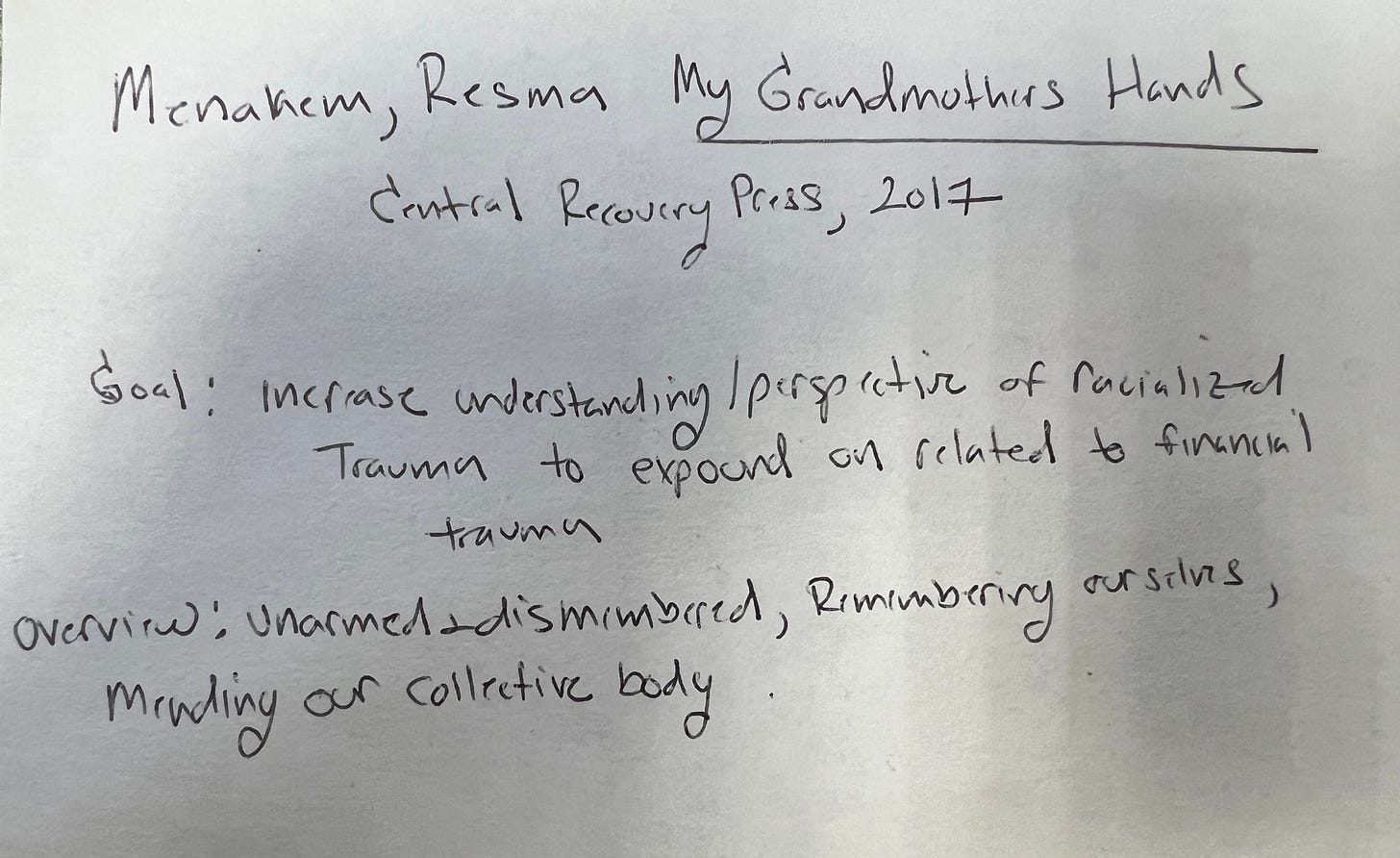Let me start off this note by saying I totally messed up.
I missed out on an opportunity to connect with the author, Resmaa Menakem at an event we both spoke at last October called “The Mental Wealth Expo” hosted by Charlemagne Tha God. At the time, I had heard of “My Grandmothers Hands” but hadn’t picked it up to read yet. So many of my peers, members of my audience, and more would hear me discussing financial trauma through a lens of the legacy of racism in the United States and would ask “have you read My Grandmothers Hands?”
They saw parallels in the way we discussed trauma existing in Black bodies. I made a mental note to pick up the book when I was ready to start writing my own. Since I didn’t read the book, I didn’t initially recognize the authors name and therefore didn’t even recognize that we likely bumped into each other at this event and didn’t speak.
Shame on me.
Nevertheless, I DID eventually pick up the book and once I did I couldn’t put it down. To my delight, much of the parallels people drew between Resmaa’s work and my own were valid. He captured not only much of the sentiment, but also the science of how trauma is stored and transferred from one body to another. As I read and listened, I took intentional notes around how I wanted to engage with his content and how I wanted to incorporate it into my own as I began writing my own book on financial trauma.
I wrote out my goal as the following: “Increase understanding/perspective of racialized trauma to expound on related to financial trauma”
Mission accomplished ✅
Resmaa does a great job at the following:
Explaining what trauma is and where it exists in the body
Breaking down the concept of race as a relatively new invention
Segmenting his focus on Black Bodies, White Bodies, and Police Bodies
Creating space for readers to feel discomfort, joy, sadness, frustration, or whatever responses as valid responses
Providing exercises to navigate the trauma stuck in the body
One of my biggest takeaways from his book in fact, was that trauma is not an emotional response, but a body response.
When I think about that in the context of financial trauma, it lets me know that talk therapy as an intervention style alone is not enough—especially when addressing racialized trauma with financial manifestations.
He emphasizes movement and somatic healing as a secondary and necessary vehicle for trauma recovery. Something of a call back to indigenous practices around healing that acknowledges energy work, drumming, tapping, humming, wailing, and simply breathing.
Here’s a quote I pulled from the book that I intend to use in mine:
Historical trauma, intergenerational trauma, institutionalized trauma (such as white-body supremacy, gender discrimination, sexual orientation discrimination, etc.) and personal trauma (including any trauma we inherit from our families genetically, or through the way they treat us, or both) often interact.
This idea of intersectionality in our trauma experience and recovery gives greater credence to the fact that not only is it reasonable to discuss issues of race in broad conversations about money—but that it’s necessary.
Another quote I pulled that made me stop while I was reading was as follows:
“Another fairly common traumatic retention is a reticence to own a home or a business, or even to be part of a startup food coop. It’s not hard to see how people whose ancestors were considered property would not be delighted by the concept of ownership.”
Just wow…
Captured perfectly as I have on many occasions prior to reading this book discussed how the idea of owning and investing for Black Americans may be particularly triggering when there is directly line historical trauma that connects us to our ancestors being the stocks that were buy and sold.
See Also: How Black Trauma may be impacting the way we spend money
As a homeowner for almost a decade now, I still remember how difficult it was for me to move through my own financial trauma to go through with the purchase before I even had to vocabulary to describe it. Now, a leading voice in financial trauma I use my story to educate others and provide them with the vocabulary to metabolize and move through their trauma.
Yet without having ever formally meeting or sharing my story, the author of this book speaks directly to my experiences as if he was there.
Of course, Menakem also acknowledges epigenetic studies in his book which always excites me because much of the current landscape of discussion on financial trauma only acknowledges the experiences we have had directly and not those inherited or observed vicariously. He also brings up how some of the trauma we navigate has “lost context” and is sort of hazey trauma.
All in all I’m doing the book a huge disservice because it was all that and more.
He does such a good job at NOT pointing the finger (in a world where I advocate for pointing of the finger) and acknowledging that even when it comes to the interactions between White bodies, Black bodies, and Police bodies we’re all navigating complex trauma responses that influence how we interact with one another.
⭐️⭐️⭐️⭐️⭐️ for me and I highly recommend.







I'm a Resmaa Menakem fan. I attended a 5-day somatic abolitionism retreat with him at Omega, and I co-facilitate a healing circle where we use My Grandmother's Hands as the text we're reading and processing through as a group. He's doing essential work in this world.🙌🏽
Thank you Rahkim for reviewing "My Grandmother's Hands" I read it in a group setting before, but I now get a clearer picture. You are helping me to see how generational trauma plus my personal trauma has affected my financial situation. I feel paralyzed by financial trauma but since I start following you, I feel hopeful that that there is a silver lining.